Nov 27, 2008 | Society, Travel
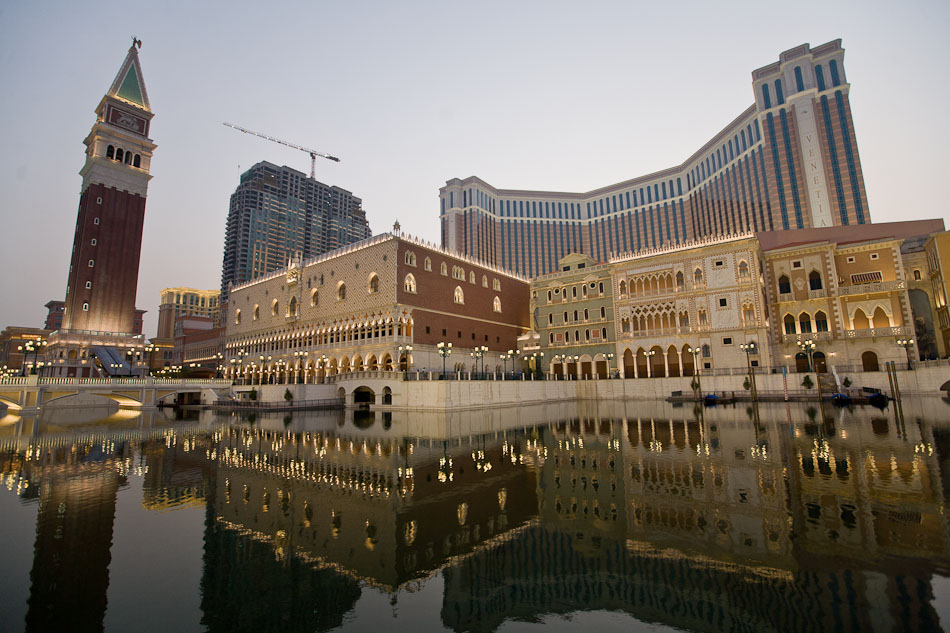
Macau’s unique character draws deeply from its eclectic cultural heritage. Both the first and last European colony in China, Portuguese sovereignty in Macau was not ceded until 1999, over 400 years after the establishment of the original settlement. Since the handover Macau has existed in a liminal realm stipulated by the “one country, two systems” policy – the Chinese state handles defense and foreign affairs but relinquishes control over domestic matters such as the police force, monetary system and political appointments. However, since Macau opened up its casino sector in 2002, the island’s socioeconomic fate was bound to the rise and fall of its entertainment resorts.
Last month I ventured to Macau to inspect the Cotai Strip, a massive development modeled after the Las Vegas Strip and home to the Las Vegas Sands’ Venetian Macau Resort. Currently the largest casino in the world, the Venetian helped Macau surpass Las Vegas in gambling revenues last year. For now Macau remains the only gambling destination within China and easily one of the most prominent within Asia. Still, the Chinese state is trying to curb the rampant profits and concomitant “dark elements” that spawn from the gambling world. Thanks to new border regulations implemented this summer, mainland Chinese can only visit Macau once every three months.
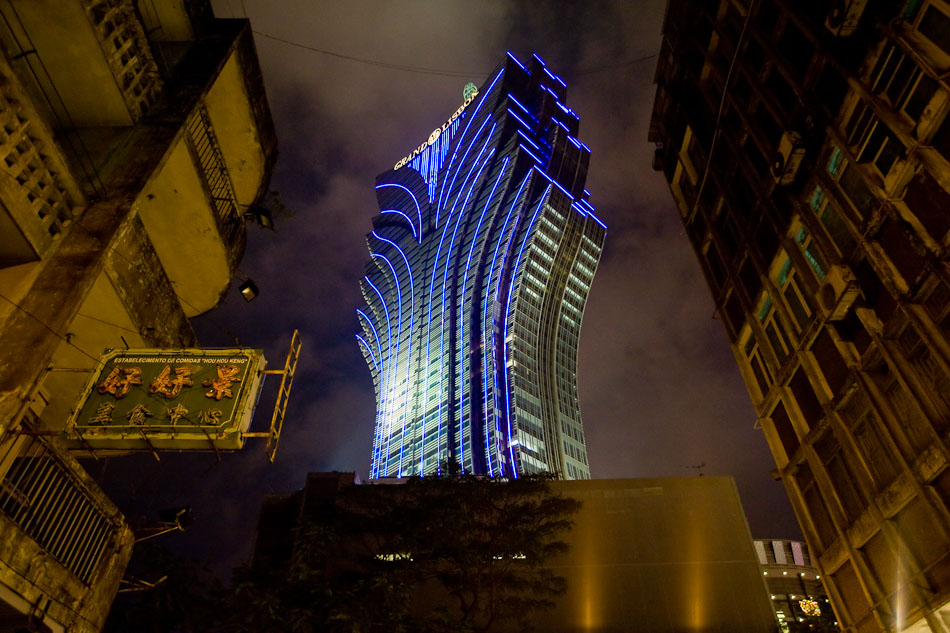
The loss of such an audience now pales in comparison to the impact of the current global financial downturn. Las Vegas Sands recently laid off 11,000 laborers and suspended work on two expansion projects planned for the Cotai Strip. MGM and Galaxy Entertainment also halted future expansion efforts. The hottest casino market in the world fizzled almost overnight. Still, a halt to the unchecked leeching of Asia’s nouveau riche might not be such a horrible turn of events. More shopping malls and roulette tables should be the least of Macau’s concerns as it continues to come to grips with its new identity as Asia’s premiere entertainment destination.
Over the past few years Macau residents have taken to the streets to protest against rampant corruption and labor issues stemming from the rise of powerful casino moguls. Now, with financial markets spiraling out of control, relying on the luxury entertainment industry no longer seems like a safe bet. For once the demand for casinos in Asia cannot meet the excessive supply in Macau. Catering to indulgent tastes at the Venetian does not fit reform-minded market trends. Even if Macau’s casinos make some sort of recovery in the coming months, the whole enterprise carries a heavier stigma of waste and decadence.
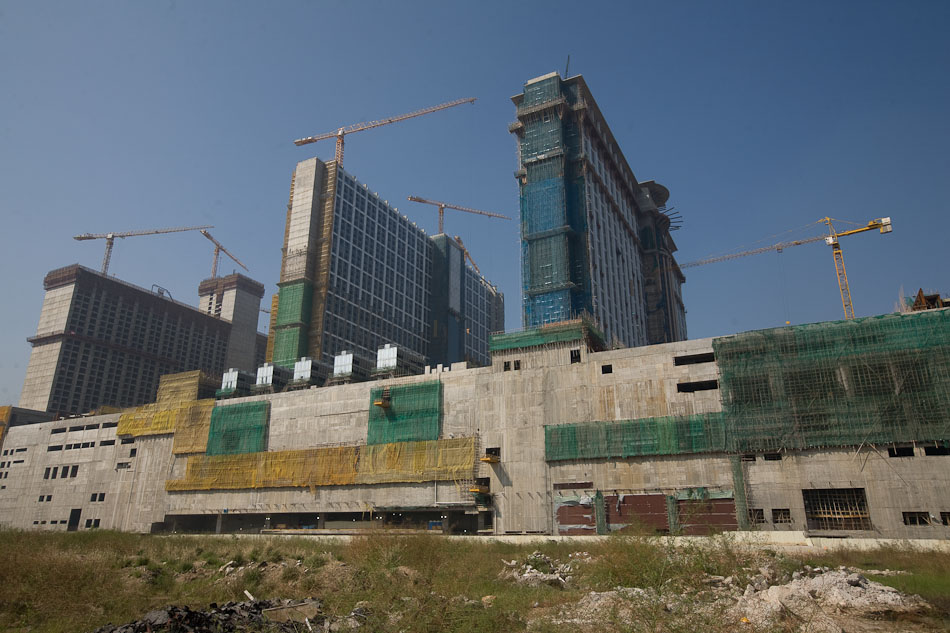
Aug 1, 2008 | Music
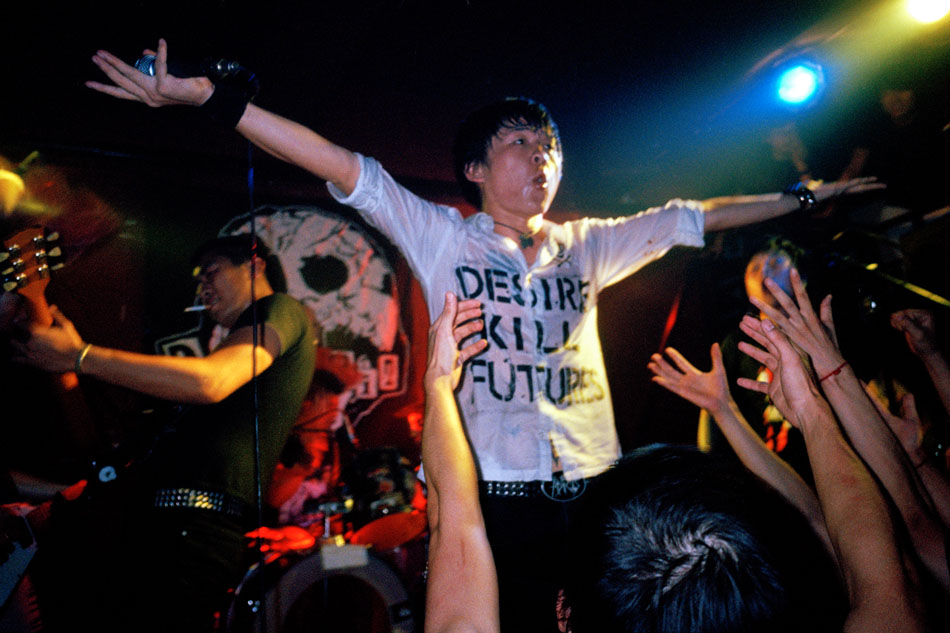
“why the fuck am i loyal to you / we don’t wanna be your victim of greed
sick of you, no future for us / how many people die in famine”
The Changsha concert was the sixth in Demerit’s Bastards of the Nation Tour, and they powered through a set of gutter punk decked out in tattered t-shirts, AK-47 bullet belts and bondage pants. Responding in kind, the crowd at 4698 Bar tore around the room in an act of mayhem rarely realized outside the smoky confines of underground music clubs across China. Meanwhile, across town on the former grounds of the Chinese Communist Party (CCP) Committee in Changsha, stood one of the most famous statues of Mao in China. With his steel arm raised to the sky, the Great Helmsman beckoned the recently founded republic into a new era. Little did he know that only thirty years after his death another wave of rebellious youth, sporting towering mohawks instead of Mao caps, would be decrying his egalitarian fantasy.
While punk in China might be old news, young hardcore bands like Demerit are breathing new life into the scene with incisive lyrics in songs like “Fight Your Apathy” and their latest album’s namesake “Bastards of the Nation.” Both call for an end to political cronyism and lambaste the mindless consumer frenzy gripping China’s youth. Touring outside of government controlled media channels, Demerit brings a nonconformist message to China’s disaffected masses. They play for the downtrodden and those still mired in poverty despite an infusion of rampant, free-market policies into the CCP’s quasi-socialist economics. Rabble-rousing within a muted population largely resigned to government control is an uphill struggle, but Demerit is on a campaign against passivity and compliance.


“send me to work, send me to war / send me to waste my life for you
hate for you, no future for us / we are just bastards of the nation”
The Bastards of the Nation Tour became an important medium for communication when Demerit’s lyrics were censored from their album liner notes earlier this year. All of the music publishing houses in China are state owned and refused to condone such incendiary material, especially leading up to the Olympics. In the end, Demerit could only publish them in English. This awkward concession limited Demerit’s access to new audiences and forced them to take their message to limited-communication Internet forums and directly to the people on tour. There is not much else they could do. While telling an authoritarian government to fuck off certainly bolsters your status in the punk world, China is still a place where voices are silenced daily. Demerit might not have garnered enough momentum for an outright crackdown, but the CCP continues to slowly gag deviant voices amongst the masses. Demerit could easily be muzzled if one piqued official decided to veto their privilege to release new CDs or perform concerts.
Touring in China is by no means a joyride. Long train journeys at odd hours, shabby lodging, and a constant diet of noodles and beer are some of the highlights. Getting paid concert by concert also makes things tight. Still, Demerit prides itself on interacting directly with their fans whether it is a concert for eight in a backwater provincial dive or a few hundred in a music-crazy urban center. Luckily there is a growing network of underground bars and clubs in Beijing, Shanghai, Nanjing, Xian, Wuhan, Guangzhou and Chengdu that promote alternative music in the face of an increasingly pop-dominated market. The 4698 Bar back in Changsha recently became another mainstay for traveling bands and is managed by a group of tattooed entrepreneurs who play in their own punk outfit Last Choice. This nascent tour circuit is turning heads both domestically and internationally and will hopefully provide an established framework for up and coming bands to find audiences in a country renowned for its draconian media control.
“so fuck your pretty thoughts / we don’t care about your perfect plans
so fuck your pretty thoughts / we still have rebel attitude”
The network of clubs also weaves through some of the most intensely developed urban centers in the world. Cities pop up almost overnight across China’s interior. Touted as an “economic miracle,” this vision of modernity spreading throughout China lines select pockets richly, but continues to leave a great number of people out on the curb – grappling with a population of 1.4 billion is no easy feat. Migrant workers from the countryside, the true force behind China’s construction boom, usually can’t afford a residence in municipalities built with their own hands. Demerit thrives off the growing dissatisfaction of people passed over in China’s newfangled Great Leap Forward. Concert goers lose themselves in music that transcends the shallow nationalism that so often defers legitimate criticism of the CCP. Demerit’s hard-hitting punk is one of the most explosive fissures in China’s music underground and will continue to resonate for some time to come.
In an almost anachronistic throwback, Demerit opens their new album with the end of Martin Luther King’s “I have a dream” speech dubbed over a rousing drum line: “I have a dream that one day even the state of Mississippi, a state sweltering with the heat of injustice, sweltering with the heat of oppression, will be transformed into an oasis of freedom and justice.” While Martin Luther King’s mission to end segregation and bigotry is seemingly disconnected from the travails of modern China, Demerit’s intent is clear. They want to stand for suppressed voices of a new generation who grew up with little future prospects and no hope to bridge the ever widening gap between the rich and the poor in China. This isn’t the fringe of China, either. Hundreds of millions of Chinese still live largely agrarian existences and will continue to go unspoken for well into this new century. China is sweltering in the heat of oppression and Demerit, at the very least, continues to vent some it at every concert.
All lyrics taken from the song Bastards of the Nation.
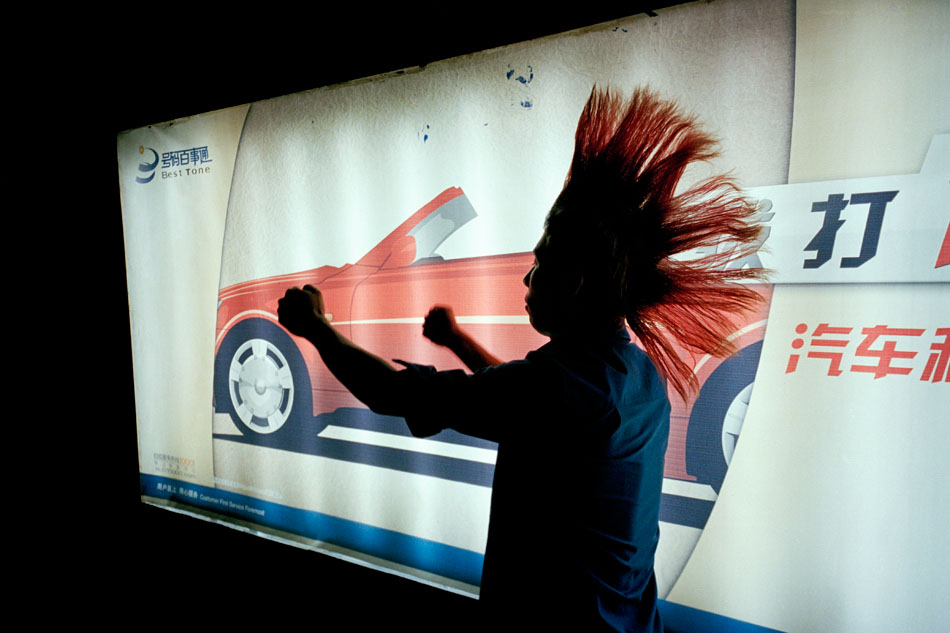
Feb 14, 2008 | Art, Youth
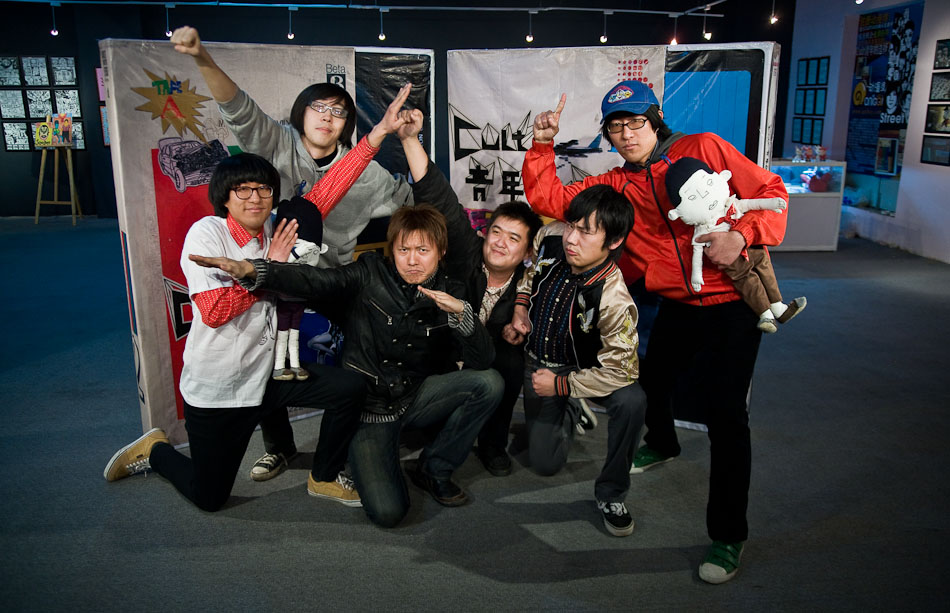
The art of telling stories using caricatures dates back to prehistoric man. Although cave paintings didn’t survive Beijing’s urban upheaval, new and more subversive forms of pictorial narration now issue forth from the comic underground. The once popular bison and ibex motifs of yore gave way to more pertinent contemporary themes such as teen angst, social detachment, and disgruntled robots. One of Beijing’s leading cliques of illustrators, aptly dubbed Cult Youth, take innovative strides with such matters in their newly minted anthology of graphic shorts.
Whether you like it or not, comic books and graphic novels are turning into one of the most widespread and influential forms of popular culture. Although China is far from eclipsing Japan’s manga scene, younger generations in Beijing with unprecedented access to foreign media are getting hooked. Cult Youth stands at the forefront of this movement. Guoqi (郭麒), one of twenty plus Cult Youth affiliated artists, noted, “that caricatures from any historical period are very valuable, but this generation in China saw many comics from different countries while growing up and now understand their important nature. People no longer believe comics are for children only.” Everyday occurrences enter the illustrator’s palette and take on new forms that fascinate both the young and old.
The most appealing nature of Cult Youth’s newest anthology is the eclectic array of themes presented in each graphic short. In many ways, it mirrors the kaleidoscope of often-conflicting interests, desires, and traditions that exist in modern China. Ca (擦), one of the founding members of Cult Youth, expounded, “We don’t say exactly who we are. We don’t pretend to represent any particular thing about China. Rather, our work grows out of our own personal interests. We have a wide range of opinions and aren’t primarily interested in any sort of pure documentary effort or work that invokes a feeling of social responsibility.” The unparalleled multiplicity of people in China defies any generalization and Cult Youth mirrors that chaos with their unstinting and often trenchant conceptual takes on life in the Middle Kingdom.
Still, many of the Cult Youth artists claim to grapple with a materialistic void growing within society and therefore feel their influence is gaining momentum. “China’s masses deal with an impoverished mainstream culture. Many are hungry for more, and it seems Cult Youth’s free and willful comics is what they need,” asserted Songqi (宋麒), Guoqi’s (郭麒) twin brother. With more dedicated readers, the anthology certainly resonates in a particular manner – the witty and insightful strips draw you in with their arresting and sometimes grotesque illustrations.
Cult Youth personifies the increasing number of Chinese becoming aware of the impact of international media on their country and the disjunction it represents from the experience of previous generations. “Older people had a world of their own,” Ca (擦) continued, “Such things cannot be passed on. The new youth access everything.” Many of the artists expressed the need to lead people to a new understanding of the information explosion occurring around them and therein present new outlets for individual expression while underhandedly capturing the pitfalls of modern China. According to Heilichi (黑荔枝), “Independent thinking leads to happiness.” There is a growing sense among the Cult Youth illustrators that even if they get labeled as outsiders, their work will continue to speak for itself.
In the end, Cult Youth still agrees on one thing: they want people to laugh and appreciate the absurdities of life. There is a mischievous air about the group as they reinterpret the already convoluted world surrounding them in Beijing. Not many of them know what the future holds, but they love their work and produced a unique anthology of graphic shorts that present a small but captivating window into contemporary China.

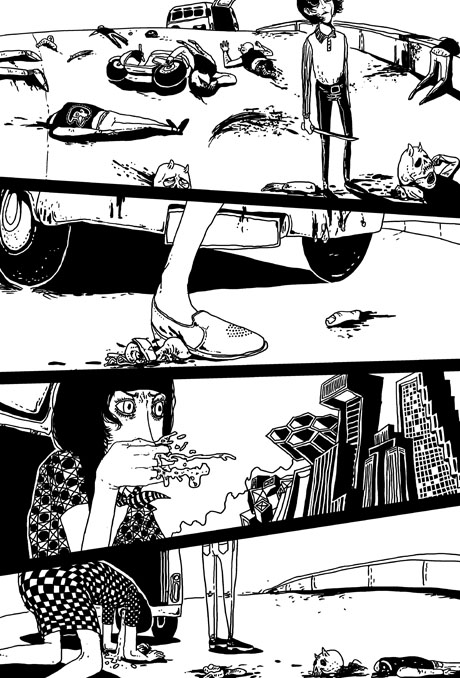
Jan 14, 2008 | Portraits, Society
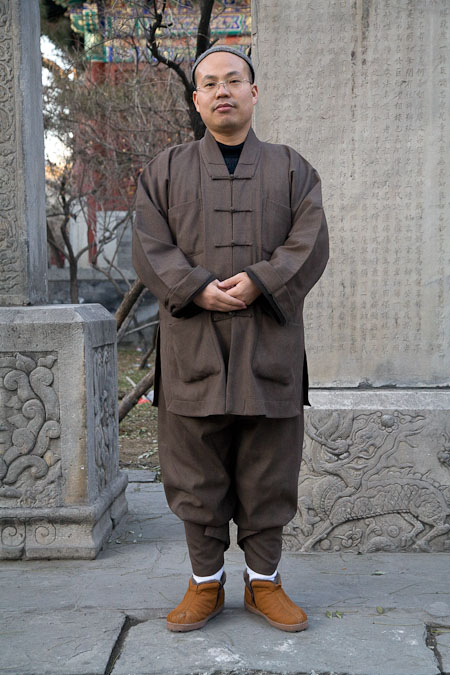
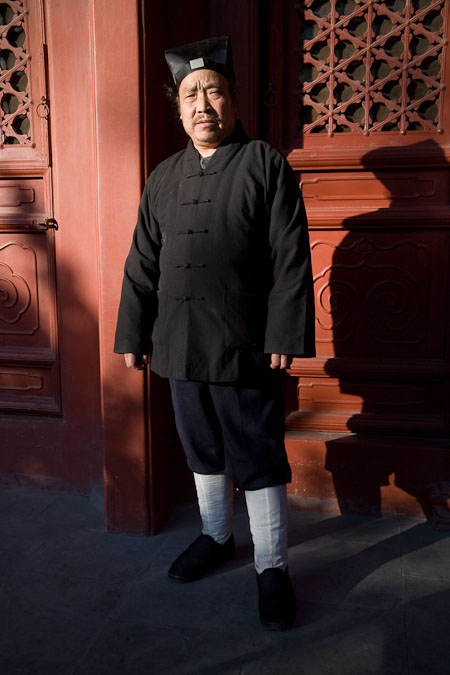
Homosexuality in China doesn’t elicit the same cross-burning fanaticism that it does in the United States. In all my time spent here I never heard of a hate crime aimed at a homosexual. Chances are that such occurrences might not get reported or covered in the media, and discrimination certainly exists in various guises, but I have yet to encounter people who label homosexuality as “evil” and support its whole scale eradication. Instead, sexual deviance tends to inspire curiosity and awkwardness amongst typical Chinese urban dwellers. It remains a latent oddity within the social milieu.
It still came as a bit of a surprise when Dinah Gardner, the longtime Gay & Lesbian columnist for TimeOut Beijing, told me we were going to the White Cloud Temple and the Source of Law Temple to ask monks about their respective views on homosexuality. Even though I consider myself well versed within the Daoist and Buddhist canon, it never really crossed my mind to ask such a question before and I was interested in how the monks would frame their responses. As the photographer, I could also sit back and watch the fireworks fly.
Lou Jiayong, a Daoist monk at the White Cloud Temple, was the first to get entrapped by Dinah. She started the interview with some elementary questions concerning Daoism and then popped him the big one: “In the West, Islam and Christianity often persecute homosexuals. How does Daoism feel about homosexuality amongst practitioners?” Lou handled the question surprisingly well. According to Daoist principle, homosexuality represents a metaphysical problem. The union of two Yang forces (male on male) creates disharmony within the Dao and must eventually be resolved. “If there is only Yin or Yang it is imbalance or disharmony,” stressed Lou. Homosexual relationships do not perpetuate natural life. At some point, Yin must mix with Yang to produce more babies. Lou did emphasize that Daoism would never discriminate against homosexuals but remained adamant that Daoist ideology could never condone what he considered lewd sexual acts and anomalies in the natural course of existence.
Zhi Yong, a Buddhist monk at the Source of Law Temple, remained unperturbed throughout his interview. Buddhist practitioners of any orientation are encouraged to stem their sexual desires in order to achieve inner peace. At the heart, there is no absolute right or wrong with regards to homosexuality. Zhi continued, “[Homosexuality] is abnormal to me, but of course from the point of view of a gay person, it is quite normal… In Buddhism everything has two sides. How can you say, ‘this is right,’ or, ‘this is wrong?’ There is no right or wrong in this world. For some people they are right, for others they are wrong.” While I might not support such moral ambiguity in other situations, being gay and Buddhist doesn’t represent a problem for lay people. Still, if you want to join a monastery you must leave any prurient thoughts at the door.
Nov 16, 2007 | Society

Oliver August submitted a great article to Wired on the Chinese state’s imprudent attempts to monitor and filter domestic Internet content. The impractical task continues to disconcert the central government as millions of new users chip away at the “Golden Shield” on a daily basis. Still, nothing can stem the burgeoning flow of digital traffic and desire for unadulterated information access. Adaptive technologies such as proxy servers and encryption constantly spoil attempts to seal outside media from online denizens. The problem will only expand as a younger, tech-savvy generation comes to age. Restricting the Internet only seems to create a stronger urge amongst adolescents to devour the forbidden fruits beyond the “Golden Shield.”
Although this does not mark the eminent demise of the Chinese Communist Party’s (CCP) iron grip on the Chinese state, the CCP is scrambling to revamp their ministry of disinformation (aka The Central Propaganda Department – 中共中央宣传部) and methods of pacifying perturbed social groups. Puppet strings amongst the masses are growing taut and sometimes snapping as the Chinese state loses ground in an increasingly influential online world. Bloggers and journalists now regularly flout bans on reporting events blacklisted by the Chinese state. As the masses continue to grow wary of the Chinese state’s official mouthpieces, they actively seek out alternative media outlets both at home and abroad. Even though only a tenth of China’s massive 1.3 billion population consistently access the Internet, these numbers are rising just as fast as China’s breakneck GDP growth.
The greatest hope for this information revolution subsists in the Chinese state’s reliance on new communication technologies to drive economic expansion. They cannot simply unplug the masses. While Burma cut the Internet with ease during recent pro-democracy protests, the Chinese State would bring untold ruin to markets that increasingly depend on the Internet to drive business and communication. It would also represent a massive step backward in desperate attempts to present a polished facade for the world during the Olympics. In any case, the future political battlefield will certainly take place online where everyone can have an equal stake much to the CCP’s dismay.
Link: The Great Firewall: China’s Misguided — and Futile — Attempt to Control What Happens Online












